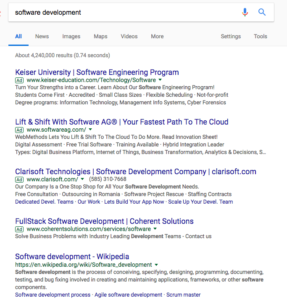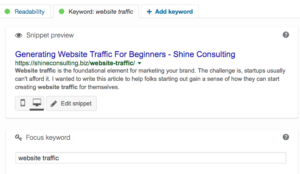Website traffic is the foundational element for marketing your brand. The challenge is, startups usually can’t afford it. I wanted to write this article to help folks starting out gain a sense of how they can start creating website traffic for themselves. Yes, you should eventually have a marketer for this, but that takes money. Capital isn’t always very available when you’re in the beginning stages.
No, this article will not have you marketing like a pro. What it will do is help you understand what you should be investing in, and how to understand it. Some of these efforts you can do yourself, depending on your competencies. There will be efforts that are best when done by a pro, but you may be able to leverage value in doing a beginner level yourself. Again, this is based on your core competencies. If you aren’t a good fit for the efforts, don’t do them. Worst case scenario, this article helps you understand the things you’ll need to invest in better so you can pick the right person, and allocate the right budget.
Generating Website Traffic
What is website traffic?
So, what is website traffic? The short answer is people, aka viewers. It’s the number of people who have visited content on your website. These people ‘landed’ on any one of your pages. They may have gotten there from an internet search, through a social media link, or a paid ad. The assumption is that this number should be high. That’s true but what’s more important is the bounce rate. That measures how long a viewer stays on your site. A low number, measured in time, indicates people are not staying on your site. So the goal is to have a high number of viewers stay as long as possible. Meaning you need quality content, and the digital strategies to drive that website traffic.

Website traffic is measured by data sent and received. Much like the interstate has traffic flowing in opposite directions. The density of traffic measures the roadways.
Again, these are strategies for beginners. These are things I think that some startups can do themselves to start getting their website traffic going. These are not things that are going to generate massive results or high-level lead generation. This will be based on your skills levels to perform the tasks.
Blogging
Blogging is a great way to capture website traffic. They’re great because they are an easy education tool for your viewers. Blogs can be leverage search engine optimization, making you visible on web searches. (More on SEO below.) You can easily share your blog links on social media pages, emails, affiliate groups, etc. The purpose of blogs is to provide valuable information to your viewers. The idea is that you will become the subject matter expert for them. Write about topics relevant to your viewers that provide them with information that’s helpful to them. If you’re a mortgage lender, write about interest rates, home value inflation, property taxes, etc.

Content sits at the head of the marketing table. Forbes reports that quality blogs combined with SEO increase your ROI chances by 13,000%. I’m no mathematician, but that’s pretty good odds.
Your writing skills should be intermediate or better to hand at blogging. If you struggle with grammar, try a free tool like Grammarly. I’d highly recommend Yoast as an SEO plugin for your blogs. The tool measures the readability of your content, which is very useful as you’re learning. Readability is how easily content can be read through search engines, and by the viewers. Ideal content is easily understood by 13-15-year-old students. Perfect content is understood by an 11-year old student. Do not try and write in the college MLA or APA style. It won’t translate well to SEO or your readers.
Search Engine Optimization
This is commonly known as SEO. SEO is one of the biggest generators of website traffic. People love to use the word but so few really know what it means, or how to shop for it. In layman’s terms, it’s the stuff under the hood that tells search engines how to find your content. It connects viewer searches to content pages. You find what you’re looking for on the WWW because of SEO. It is essential to building your website traffic. If you have good blogging skills, try your hand at learning SEO. It is NOT learnable by everyone. Again, I recommend Yoast for this. They ‘score’ your performance and make it easy to see where you need to make changes. The way the information is communicated is thorough. I would say the skill level is intermediate to get started.
If you want to learn more about using Yoast and doing your own SEO, I wrote an article that should be really helpful. Yoast – A Simple Guide to Doing Your Own SEO.
Social Media
Social media marketing sits at the head of the round table when it comes to marketing. It is often underused by startups. Social media will play a large role in improving your website traffic. You can easily use it to promote your SEO keywords, target specific audiences, and get your info out in affiliates/groups. Social media is relatively easy to use, from a navigation perspective. The trick is to create good content. Much like the idea of blogs. Make sure you’re posting helpful information in smaller, bite sizes pieces. Post links to your content that uses SEO. Like landing pages, services, blogs, etc.
I always recommend that startups leverage several social media accounts. The website traffic you can generate is more successful if you leverage different platforms. This will be contingent on your business focus. B2C or B2B will have different focuses. The type of customers you have will impact this strategy as well. Your level of comfort with social media and writing content should always be considered. Fewer platforms if you’re a beginner. You can always add more. Setting up accounts and not using them can be more damaging to your website traffic. SEO uses social media traffic as part of the ‘ranking’ system.
Paid Ads
I will always urge caution here for beginners. A lot of startups jump right to this step assuming that paid ads will generate ROI. There’s a LOT to know and consider here. I wouldn’t touch it if you aren’t at least intermediate to advanced. Sponsored posts on social media is a little less risky than pay per click ads on Google. Paid ads and SEO are costly to hire a professional. A few thousand every month is pretty easy to drop here. If you are comfortable in doing ads, they can help generate website traffic. Unless you’re really comfortable, hold off on this until you have a better budget. Industries vary, and so do locations. A good minimum budget for paid ads and SEO is $1,500. I’ve seen companies easily spend $10,000 – $15,000 dollars a month. Zillow spends almost $1,000,000 alone on SEO.

Paid ads for PPC will appear top, bottom, and to the right on Google searches. Your monthly budget determines your positioning.
Don’t be afraid of paid ads, just be smart about them. They work if you know how to work them. If you are using them, be sure to stay on top of your analytics. If your bounce rate stays high, you need content improvement before your paid ads and SEO will start generating more ROI. Website traffic is not directly relative to income. Always remember that.
Lead Magnets
If you offer any classes, e-books, online courses, manuals, etc. consider using them as a lead magnet. This generates website traffic by using a value-added product. Training videos, workshops, templates. There are lots of tangible things your company can offer. If you are service based, offer a product that compliments your services. The idea is that you exchange their information for the product. These products are either free or deeply discounted. The person is sent information regularly by email, phone, or text. Be sure to include links to your content. This is how this will generate website traffic. It’s also a great way to add leads to your sales pipeline.

A lead magnet should attract people now that could be customers in the future. Draw them in with a bite-sized piece of value that is complementary to a larger product or service.
Co-Op Marketing
I love co-op marketing. Writing blogs for one another. Sharing each other’s info on social media. Adding SEO and links for each other. Having friends you network within the business community can help you identify co-op opportunities. Are you really good at social media? Is a friend good at blogging? Why not help each other and exchange that knowledge back and forth? My friend owns a business and was a journalist. She includes blogs about us on her site. We help coach her on SEO. It’s OK to get help. Having more than one person sharing information is better for your SEO. Involve your friends and their businesses. Help them, and get help from them. Collaboration is huge in generating website traffic. It’s a great way to learn more, and improve your existing skills.
Final Thoughts
I can’t stress enough that these efforts work best when they are done on a “professional” level. That’s not always feasible. It is likely you can do at least some of these efforts on your own. Even if on a beginner’s level. Make sure you’re comfortable, though. Don’t be afraid to get help where you need it. You don’t have to be great to start but you do have the start to be great. I’ve seen a lot of startup marketing. It isn’t always pretty but swans don’t always start out that way either. Marketing is a growing process. It’s about learning, evolving, adapting. Website traffic is really that important. My goal is to give you options and hope if you have little to no budget. Everyone started somewhere.
If you want to chat more about these areas or others, Let’s Chat! I’d love to see where I can help, and give you a few pointers.



